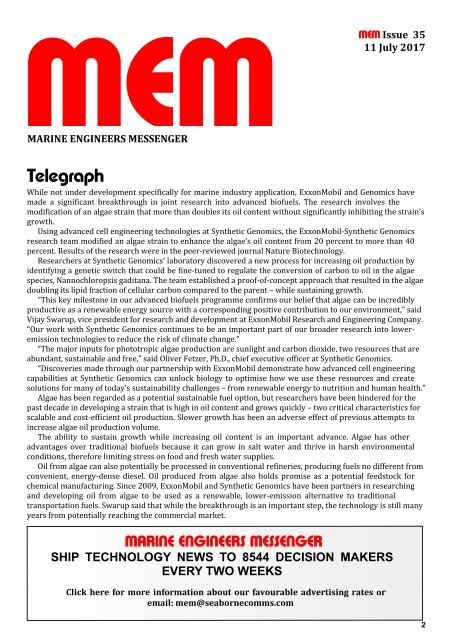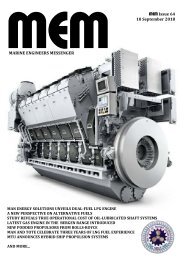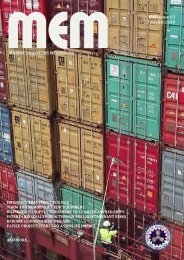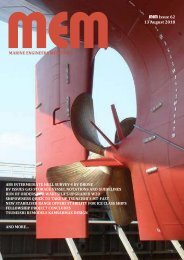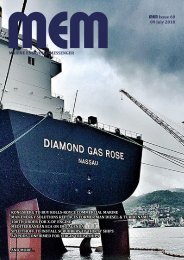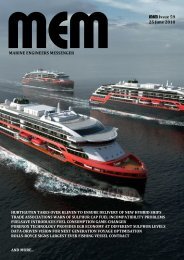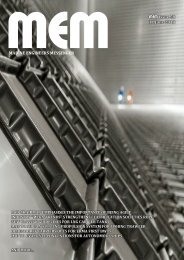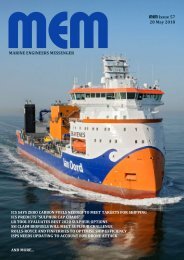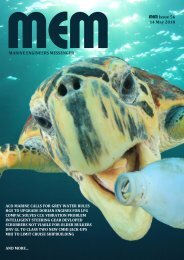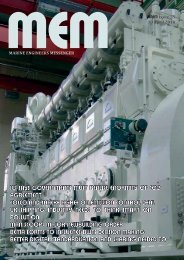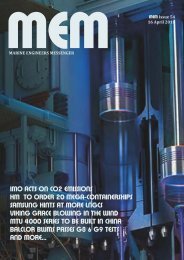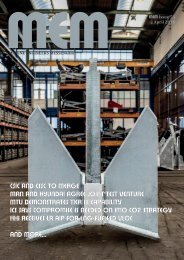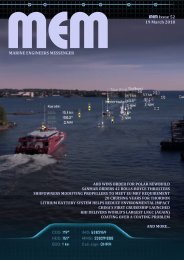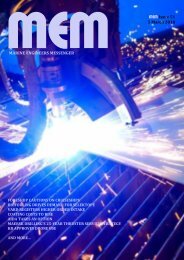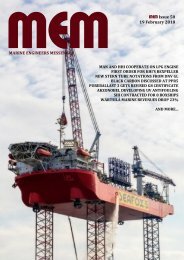MEM35
Marine Engineers Messenger Volume 2 Issue 35
Marine Engineers Messenger Volume 2 Issue 35
Create successful ePaper yourself
Turn your PDF publications into a flip-book with our unique Google optimized e-Paper software.
MEM<br />
MARINE ENGINEERS MESSENGER<br />
MEM Issue 35<br />
11 July 2017<br />
Telegraph<br />
While not under development specifically for marine industry application, ExxonMobil and Genomics have<br />
made a significant breakthrough in joint research into advanced biofuels. The research involves the<br />
modification of an algae strain that more than doubles its oil content without significantly inhibiting the strain’s<br />
growth.<br />
Using advanced cell engineering technologies at Synthetic Genomics, the ExxonMobil-Synthetic Genomics<br />
research team modified an algae strain to enhance the algae’s oil content from 20 percent to more than 40<br />
percent. Results of the research were in the peer-reviewed journal Nature Biotechnology.<br />
Researchers at Synthetic Genomics’ laboratory discovered a new process for increasing oil production by<br />
identifying a genetic switch that could be fine-tuned to regulate the conversion of carbon to oil in the algae<br />
species, Nannochloropsis gaditana. The team established a proof-of-concept approach that resulted in the algae<br />
doubling its lipid fraction of cellular carbon compared to the parent – while sustaining growth.<br />
“This key milestone in our advanced biofuels programme confirms our belief that algae can be incredibly<br />
productive as a renewable energy source with a corresponding positive contribution to our environment,” said<br />
Vijay Swarup, vice president for research and development at ExxonMobil Research and Engineering Company.<br />
“Our work with Synthetic Genomics continues to be an important part of our broader research into loweremission<br />
technologies to reduce the risk of climate change.”<br />
“The major inputs for phototropic algae production are sunlight and carbon dioxide, two resources that are<br />
abundant, sustainable and free,” said Oliver Fetzer, Ph.D., chief executive officer at Synthetic Genomics.<br />
“Discoveries made through our partnership with ExxonMobil demonstrate how advanced cell engineering<br />
capabilities at Synthetic Genomics can unlock biology to optimise how we use these resources and create<br />
solutions for many of today’s sustainability challenges – from renewable energy to nutrition and human health.”<br />
Algae has been regarded as a potential sustainable fuel option, but researchers have been hindered for the<br />
past decade in developing a strain that is high in oil content and grows quickly – two critical characteristics for<br />
scalable and cost-efficient oil production. Slower growth has been an adverse effect of previous attempts to<br />
increase algae oil production volume.<br />
The ability to sustain growth while increasing oil content is an important advance. Algae has other<br />
advantages over traditional biofuels because it can grow in salt water and thrive in harsh environmental<br />
conditions, therefore limiting stress on food and fresh water supplies.<br />
Oil from algae can also potentially be processed in conventional refineries, producing fuels no different from<br />
convenient, energy-dense diesel. Oil produced from algae also holds promise as a potential feedstock for<br />
chemical manufacturing. Since 2009, ExxonMobil and Synthetic Genomics have been partners in researching<br />
and developing oil from algae to be used as a renewable, lower-emission alternative to traditional<br />
transportation fuels. Swarup said that while the breakthrough is an important step, the technology is still many<br />
years from potentially reaching the commercial market.<br />
MARINE ENGINEERS MESSENGER<br />
SHIP TECHNOLOGY NEWS TO 8544 DECISION MAKERS<br />
EVERY TWO WEEKS<br />
Click here for more information about our favourable advertising rates or<br />
email: mem@seabornecomms.com<br />
2


